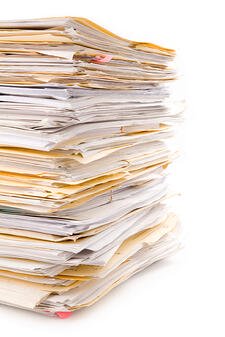How to Use Your Optical Software to Ditch Paper Once and For All
It's no secret that paper slows things down in your practice. The more paper methods you still rely on, the more your workflow is affected. Many practices are searching for ways to use less and less paper for their daily tasks. Completely eliminating it from your office can be tricky, but we've got some steps that will help you get there. The more you utilize technology in your practice, the less paper you'll use. So take these tips and finally kick that paper habit in your practice!
Embrace Your Optical Software to Fully Eliminate Paper
 EHR
EHR
Many practices have made the switch to using electronic health records; if you haven't yet made the plunge into the world of EHR, now is the time. By storing patient information electronically, you'll save tons of room in your office and find that EHR makes it easier to store and search for patient information.Your patients will love the benefits that an EHR has to offer as well since they will have easier access to all of their health information. Plus, EHRs make it easier to share records with the patient's other healthcare providers, meaning that your patients will be receiving more complete and coordinated care.
Workstations with Computers in Every Room
Carrying around paper charts from room to room during an exam is a waste. Set up computers in every room so the information you need during an exam is waiting for you at the workstation in the room. Using computers to send information between rooms will keep your workflow fast and fluid. Or, if your EHR is tablet friendly you can carry tablets from room to room to keep your workflow running smooth.
Patient Portal
One of the biggest uses of paper in many eyecare practices comes from patient forms. The easiest way to eliminate this is through use of patient portals. Once patients schedule their appointments, send them the link to their patient portal where they can fill out all the necessary pre-exam paperwork online. That way patient information is already in your software system, right where you need it. Your patients will also love that their appointments will take less time since they won't have to sit in your waiting room filling out paperwork before they can see the OD.
HIPAA Forms Scanned into Your System
HIPAA compliance is not something to take lightly in your practice, but it doesn't mean you need to use unnecessary paper to maintain compliance. One way to do this is to keep a laminated copy of your HIPAA forms at the front desk so that your staff can quickly scan the form into the patient's electronic record and simply erase the signature for the next patient to use.
Online Ordering & Claim Filing
Submitting orders and claims online is the final step for eliminating paper in your office. Not only does this method allow you to receive your products and reimbursements faster, but it eliminates errors that can typically occur with phone and fax orders, with automatic error checking features. That means your product orders will be correct and you'll have less denied claims.
Whether you've taken great strides in moving towards a paperless office, or are just looking to get started, keep working toward complete elimination of paper! What are some strategies you've implemented in your own practice to eliminate paper?
Subscribe to the blog for more efficiency tips!

